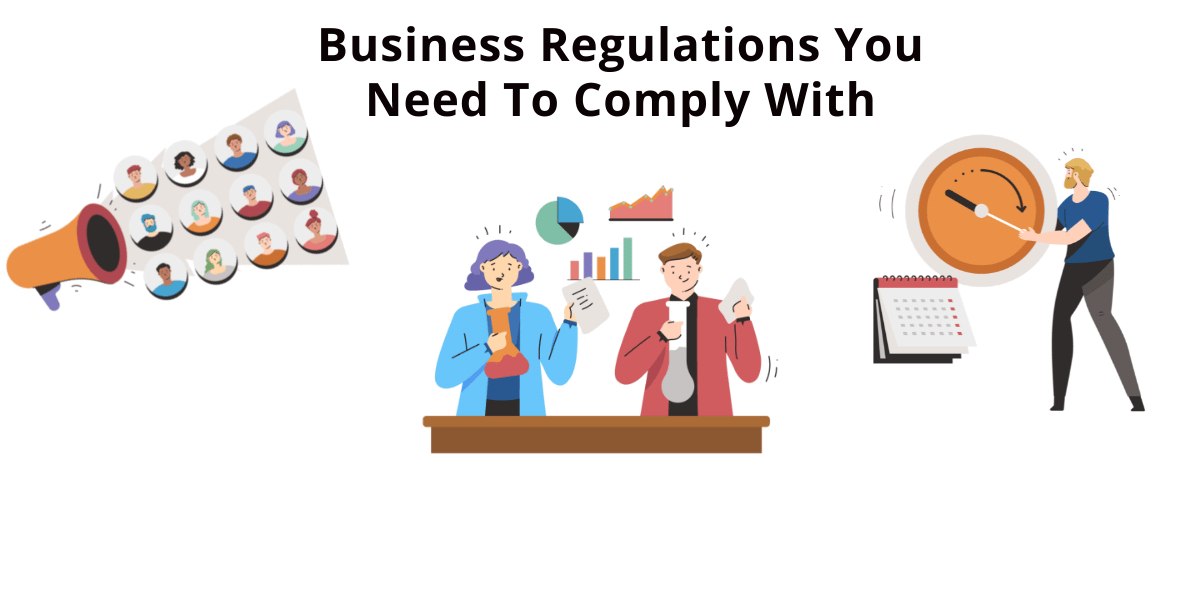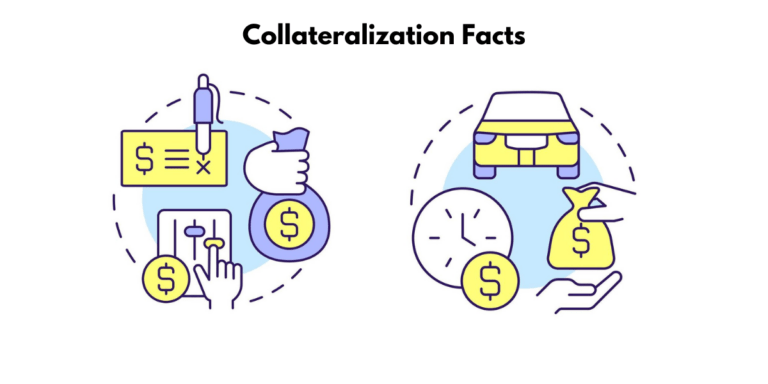Government Laws for Businesses: Important Government Regulations on Business You Must Know
Importance of Government Regulations
All companies must adhere to federal, state, and local statutes, necessitating government regulations on business. Regulatory bodies enforce these regulations at the legislative level. Some of these regulations impact how a company reports their income or pays taxes, while others regulate how they dispose of their excess materials or waste.
Regulations are essential for any business to know, but the sheer volume is enough to make your head spin. It’s not easy finding all of the road rules to understand what they mean and how they pertain specifically to you. Luckily, some resources can help guide you through this maze easily, so don’t worry about it too much!
Government regulation refers to the legislation that controls and oversees businesses, industries, and individuals. Various forms of regulations exist concerning business such as safeguarding the environment, protecting consumers, promoting fair competition, and ensuring workplace safety.
There are also federal-state-local governmental agencies that can help entrepreneurs understand the process for regulatory compliance with these rules and provide examples of how they might look in practice.

Do government regulations help businesses?
The opinions on how much and what kind of government regulations help or hinder businesses vary. Some companies prosper as a result of complex regulation, while others may suffer from excessive regulation.
Some essential government regulations are designed to protect consumers, while others help businesses. While some companies may benefit from regulation, it is also possible that they will be harmed by over-regulation or filed under a category that doesn’t apply. For business owners and entrepreneurs to succeed in today’s evolving economy, they must understand what kinds of regulations their industry faces so these can be addressed accordingly with proper compliance strategies.
Government regulations are a rule that we must follow or face penalties. Business owners and stakeholders should stay abreast of any government regulation as they can help them understand how to serve their clients better, uphold legal responsibility, and even save money.
Which regulations apply to your company?
It is essential to know the regulations to stay on top of your game. Regulations offer protection from dire economic conditions and help businesses during both good times and bad. Various government loans can be obtained, making it easier for you to keep up with regulation changes by offering assistance when needed.

Taxes
Businesses have to pay taxes that are determined by the type of entity they operate as. Sole proprietorships and limited liability companies only have to pay income tax, while corporations also must pay self-employment taxes.
All business owners can anticipate paying income tax, self-employment taxes. These payments are made to the federal government by individuals who work for themselves and not an employer. The self-employed individual pays Social Security and Medicare benefits through their contributions to these governments programs while also contributing money to the US Treasury.
The government has set up various ways of regulating business to protect the public. Some are more common than others, but all have benefits and drawbacks for both businesses and consumers. Furthermore, taxes on employment are addressed by the Internal Revenue Service (IRS), which will help you keep track of your payroll tax obligations while also helping to collect taxes owed from employees who owe money per federal law or state laws.
The Internal Revenue Service, or IRS, is responsible for collecting taxes. This includes the federal income tax and state income taxes that are imposed on businesses. Businesses must also perform routine annual tasks such as submitting an accurate business tax return to the IRS and their state’s revenue department to avoid penalties.
Income tax
Income taxes are charged to businesses based on the payroll and more. In most countries, employees must pay income tax as well.
The IRS wants you to pay what you owe. If the amount is not paid, there will be penalties and jail time. The best way to avoid getting caught out of pocket for taxes isn’t cheap; it requires a lot of planning and effort on your part to get everything done right before tax season rolls around again.
Income tax is the taxation of income and profits, typically by the government. Bookkeeping services alleviate the stress of accurate record-keeping as they provide quick financial service at competitive rates.
Estimated tax
The Supreme Court decided in favor of brick-and-mortar retailers over online retailers. States are now experimenting with how to implement sales tax for out-of-state online retailers.
Online retailers should be mindful of the South Dakota v Wayfair case. There may be a threshold under which an online retailer would not have to pay sales tax in some states, and small businesses that sell out-of-state over the internet will need to keep tabs on this change.
Employment tax
The Supreme Court decided that brick and mortar retailers were required to collect sales tax from their customers. States cannot require online retailers to collect sales tax in states where they don’t do business.
Although the Supreme Court decided to close a loophole that allowed out-of-state retailers not to collect state sales tax, states consider how they will collect taxes from online retailers.
Excise taxes
Businesses have to pay taxes. Business owners can anticipate paying income tax, self-employment tax, social security tax, and unemployment taxes. An entity determines which taxes a business has to pay and how it pays them.
There are three types of taxes that people should consider when filing their taxes: estimated tax, self-employment tax, and employment tax. Your Social Security and Medicare benefits will be influenced by the first two. At the same time, the third one covers federal income tax withheld from wages paid by employees in addition to state unemployment insurance contributions.
Businesses are required to file excise taxes, which are collected at each production stage for goods or services. Local property taxes may apply if your business owns real estate such as vehicles, land, or buildings in the state where you have a business establishment.

Labor
The Fair Labor Standards Act (FLSA) was signed in 1938. It established the minimum wage, which is currently $7.25 per hour and one and one-half times overtime pay for every hour over 40 hours worked in a week.
The federal government also requires employers to abide by state laws, so be sure to check your state’s labor law regarding this topic before you start hiring employees or making any other business decisions.
Most private industries are subject to safety and health requirements established by the OSHA. It also mandates employers to pass workplace inspections and investigations to keep their businesses compliant with the government regulations.
According to FMLA (Family Medical Leave Act), employers are obligated to grant a maximum of 12 weeks of job-protected leave for the birth or adoption of a child or in case of a serious illness.
In addition to the federal government not mandating paid leave, some states do mandate it. The Affordable Care Act also mandates companies with more than 50 full-time employees to report their health insurance offerings to the IRS annually. Employers are required by law to provide affordable, minimum essential coverage and have a federal government classification system.
The government has made it more difficult for employers to employ people under independent contractors or freelancers. States have tightened their rules making it more likely to be considered employees instead of independent contractors or increased the penalties for violating federal standards.

Wages and hours
The government mandates that employees are allowed to take COVID-19 leave without pay. This requires employers to provide paid time off to their employees for family and medical emergencies, and some even go as far as offering a retirement plan. The FFCRA states that if an employee is required by law or regulations to work more hours than the regular 40 hour week, they must be compensated at least minimum wage for all hours worked over 40 each week. Some companies have opted out of this requirement by offering a tax credit through the IRS, reducing the cost of COVID-19 leave for an employer who offers it.
The COVID-19-related leave provisions are scheduled to sunset at the end of 2020. The relief package extends through March 2021. The NRA coverage for employers required to offer this leave will also extend until March 2021.
When employees are not paid for the time they work, it is considered wage theft. These laws vary from state to state, so be sure to check with your employer’s HR department about what leave policies and other compensation options you have available in your area.
Workplace safety and health
COVID-19 is an Occupational Safety and Health Administration (OSHA) standard requiring employers to provide a workplace with a safe and healthful environment. COVID-19 was established in response to the dangers of numerous chemical substances found in the workplaces of many sectors, including manufacturing plants, construction sites, warehouses, hospitals/clinics, schools/workplaces for students under 18 years old. There are four states which have implemented emergency standards: New York State has adopted a regulation similar to COVID-19; Delaware has also passed a law similarly targeting hazardous chemicals; California is currently implementing its new regulations on occupational safety and health at worksites across industries with no specific timeline given; Massachusetts enacted legislation prohibiting employers from exposing workers to harmful levels of beryllium. The federal government is expected to adopt similar regulations for employers, though there is no specific timeline for when this will happen.
As we know, no one wants to get sick or hurt at work. With the COVID-19 vaccine becoming more widely available and with greater enforcement of federal regulations on workplace safety and health, employers need to maintain their standards not to be penalized by both state and federal governments.
Equal opportunity
The EEOC, a federal agency, safeguards the civil rights of workers. Employers must have at least 15 employees to comply with EEOC.
The Equal Employment Opportunity Commission mandates that certain practices, such as gender, race, religion, and disability, cannot influence hiring practices. The EEOC has a specific list of elements that employers are not allowed to consider in their decision-making process for applicants.
Unions
Unions are organizations that bargain for the rights of employees to organize and have a voice in their working conditions. Unions negotiate with employers to establish wages, health care benefits, and safety standards. To be part of a union, there needs to be an election process where workers vote on whether they want one or not. The government has specific regulations on businesses that engage in certain business activities if they employ unionized labor.
The first step to forming a labor union is contacting the website of the Office of Labor-Management Standards. This office provides information and resources on organizing and bargaining for employees and employers in New York State.

Employment
The government has many regulations for business owners to follow. There are laws related to employment, equal pay, and accommodations that protect employees from discrimination based on race, color, religion, sex, sexual orientation, disability, or national origin. Businesses also have the responsibility of providing reasonable accommodations for their employees with disabilities or religious beliefs.
The government is ever-changing and enforcing new regulations on business. While these changes may be difficult to navigate, knowing they can help you stay informed as a business owner or manager.
Here’s an overview of employment laws in the US:
Employment discrimination – Business owners cannot retaliate against employees who report discrimination or participate in a lawsuit. Reporting data: The EEOC requires companies with at least 100 employees to submit a yearly report outlining staff’s ethnicity, race, and gender.
Non-US citizen workers
The United States government mandates that employers must verify their employees’ legal employment. Employers must also confirm the employment of non-US citizens and residents with a specific list of categories and authorized periods of stay.
Employee benefit security
The European Union’s General Data Protection Regulation will be enforced in the United States. California has its own version of a consumer data privacy law, and businesses collecting customer information must adhere to transparency, data sharing, and management requirements.
Small businesses are getting requests from big companies asking them how they’re complying with stringent cybersecurity rules. As states and cities adopt more data privacy and security measures, small businesses will have to become increasingly aware of each measure in jurisdictions where they do business. These laws can be strict on companies even if they don’t operate in the region, but awareness is crucial for avoiding fines.
Companies are required by the federal law, the Consumer Protection Act of 1968, to provide sufficient information regarding their products, services, and contracts. Truthfulness in advertisements is also mandated by this act. The FTC monitors the enforcement of this act and has a consumer response hotline for any inquiries.

Family and medical leave
Paid sick leave laws are becoming more popular in local and state governments. Forty-five states have passed paid sick leave laws, five states adopting paid family leave beyond the federal Family Medical Leave Act (FMLA).
The Family and Medical Leave Act applies to employers with multiple locations. It provides up to 12 weeks of paid leave for employees who need time off due to the birth or adoption of a child, serious illness, injury, medical condition that makes it difficult for an employee to work (e.g., cancer), or other family member’s serious illness requiring care. Governor Andrew Cuomo has until January 17th, 2019, before he has signed this bill into law if he wishes to do so.
The National Labor Relations Act guarantees employees the right to organize and bargain collectively with their employer through their chosen representatives. It also gives them the right to refrain from some types of union activity.
Antitrust regulations
Antitrust regulations prevent businesses from fixing prices and dividing markets. This is most commonly seen in price-fixing agreements between competitors, which are illegal under antitrust laws. Antitrust regulations were initially put in place to reduce or eliminate examples of oligopoly that had been prevalent during the Industrial Revolution. The first instance of an antitrust lawsuit was brought by a group called “the Whisky Trust,” who tried to fix their prices for whiskey production before being sued by federal regulators. After the Supreme Court ruled in favor of the Whisky Trust, it became difficult for the federal government to enforce antitrust laws. This was when Standard Oil gained such a large amount of power and control over its industry.
The American Tobacco and Standard Oil trusts were dissolved in 1911 after the US v. E. Knight Company ruling, which was a landmark antitrust case that set out to protect consumers from monopolies by regulating prices of goods and services within specific industries such as tobacco, oil refining, steel production, and distribution.
This decision resulted in more stringent regulations concerning how large corporations can operate. They do not grow too powerful due to their financial resources alone while still providing opportunities for smaller firms with less capitalization than larger companies.
Conspiring to fix market prices
The government relies primarily on business regulation as a means of control. Although its intended purpose is to promote fair competition and functional markets, it frequently falls short of achieving this goal.
Additionally, it is important to consider the costs and benefits of regulating market prices. Regulation may yield many benefits in some instances, but losses are also incurred in time, money, indecision, and productivity.
Price discrimination
Price discrimination is the practice of charging different prices to different people for the same product or service. Businesses can maximize profits when demand exceeds supply or consumers who want better deals than those offered by competitors.
The antitrust laws are designed to prevent companies from unfairly pushing up prices on consumers and businesses while blocking competition.
Conspiring to boycott
Businesses often need to be aware of antitrust regulations in the United States, which the federal government oversees. If your business sells products or provides services that might affect other companies, you may need a license. Licenses are also required if businesses want to sell alcohol or provide beauty salons.
Conspiring to boycott is when two or more people damage a company by not purchasing their product. The National Council of State Legislature’s Occupational Licensing Database provides information about rules and regulations in each state, as well as the Small Business Association’s licenses and permits applications.
Conspiring to allocate markets or customers
The government creates regulations to implement laws. Regulations are created for the public good, but they often do not meet expectations or achieve their social goals. Regulation is necessary for society and has unintended costs.
Regulation is imposed on individuals and organizations to achieve public benefits. However, the growth of government involvement in a market system can restrict our ability to achieve goals because regulation sometimes causes losses in time, money, indecision, or productivity. The price system has efficiency under certain circumstances when there are interventions by governments into markets.
Monopolization
Monopolies are achieved by acquisition, exclusion, or control of market prices. Businesses should be aware that monopolies can lead to higher prices and reduced competition.
The monopoly principle is based on the idea that if one firm has a competitive advantage, it will earn higher profits than its competitors. Monopolies are difficult for governments to regulate because they often result in price-fixing schemes and anti-competitive behavior, hurting consumers.
Advertising
The FTC enforces laws to regulate advertising. Businesses cannot adopt deceptive practices or advertise with unsubstantiated claims that are not backed by solid proof. Companies must disclose how much of their product is made within the country, and they must also be truthful in their advertisements.
First and foremost, online advertising must maintain truthful standards. The CAN-SPAM Act requires that companies provide an opt-out mechanism for all commercial email messages sent to a recipient’s email address. Additionally, the Consumer Fraud or Deceptive Practices Statute regulates other deceptive marketing practices such as telemarketing calls and false claims about products’ quality to ensure consumers are protected from deceitful business practices on the internet.
Email marketing
The US CAN-SPAM Act of 2003 (CASL) is a law that regulates the use of electronic messages to sell products or services, collect money, or conduct business. CASL gives businesses three responsibilities:
False or misleading headers are not allowed, and deceptive headlines are prohibited. Indicating that the email is an advertisement is also forbidden, but CASL does allow for certain kinds of advertising in emails sent to consumers if they meet specific requirements.
Environmental regulations
The EPA requires compliance for certain industries. For example, some environmental regulations relating to marketing and language apply to retailers or suppliers. Others control environmental laws and regulations from businesses in the service industry.
There are environmental regulations in place for the different types of business. For example, you can find rules and regulations on handling your waste or complying with clean air levels.
The EPA’s website is a good resource for finding more information about these government agencies that regulate industries like yours. The website also has resources specifically tailored to small businesses, including an interactive guide called the Small Business Gateway. When searching for any relevant information needed to do business legally within the United States, you can search by industry type.
Lastly, you should consult your state environmental protection agency to ensure that all of the rules and regulations are being met before starting a business in any particular location.

Privacy
The Federal Business Regulations protect customers’ privacy. They state that businesses must follow proper procedures when using and disposing of credit reports, which may maintain certain levels of customer trust in the business.
In addition to these two regulations, businesses should also be aware of the California Consumer Privacy Act. The CCPA gives consumers the right to delete certain personal information collected by businesses, and it is legally binding for all companies operating in California.
Licenses
Government regulations on business are becoming more common. Business owners may be required to maintain licenses according to their industry and location, which can vary according to what the license entails. For example, businesses selling products like tobacco and alcohol must regularly renew their sales permits because those products are heavily regulated. In order to adhere to government regulations regarding business ownership, professionals such as plumbers and nurses may be required to acquire specific certifications and licenses. The documents for staying legally compliant vary depending on your industry and location.
Insurance
All states, except for Texas, require businesses with employees to purchase workers’ comp insurance. This type of insurance is a legal requirement that protects both the business and its employees from financial losses in case of injury or illness due to work-related incidents.
Additionally, employers are obligated to purchase workers comp insurance if they have employees, and it will protect both you and your employee in case of an accident on the job. In most cases, the insurance company can defray a company’s medical care expenses after filing for compensation from them due to injury.
Reporting pay data
Employers must report pay data for each employee. This ensures that women and men are not paid significantly different amounts of money with the same job title and responsibilities.
The government has been issuing new requirements to businesses over the years. One of these was issued in 2017 by the Equal Employment Opportunity Commission, which required pay equity and salary reporting through Paychex, among other companies.
Paychex is a company that collects this data for businesses across different industries, giving them access to the relevant information they need without having to do all of the work themselves.
Collecting sales tax
Businesses must collect sales tax in any state with which they have nexus. Nexus is defined as the physical presence in the state or whether an employee works there. States can also make their laws for businesses based on physical connection to states or hiring employees within that state. Online sellers may be required to collect sales tax in any state that they sell in.
As a result of the growth in online retail, states are considering collecting taxes from out-of-state retailers. Depending on what you’re selling and where it’s being sold, you might be exempt. There is also an argument that those who sell goods should pay sales tax because they’ll still benefit from lower prices through their local stores’ economies of scale.
Some online sellers are exempt from state sales tax regulations, but the list of exemptions is growing. A person or company can have their goods delivered to a customer’s home without paying sales tax.
- How Much Does It Cost to Have Taxes Prepared by an Accountant? - September 9, 2023
- Government Laws for Businesses: Important Government Regulations on Business You Must Know - February 15, 2022
- 10 Steps to Successfully Calculating Your Marginal Profit - January 18, 2022







